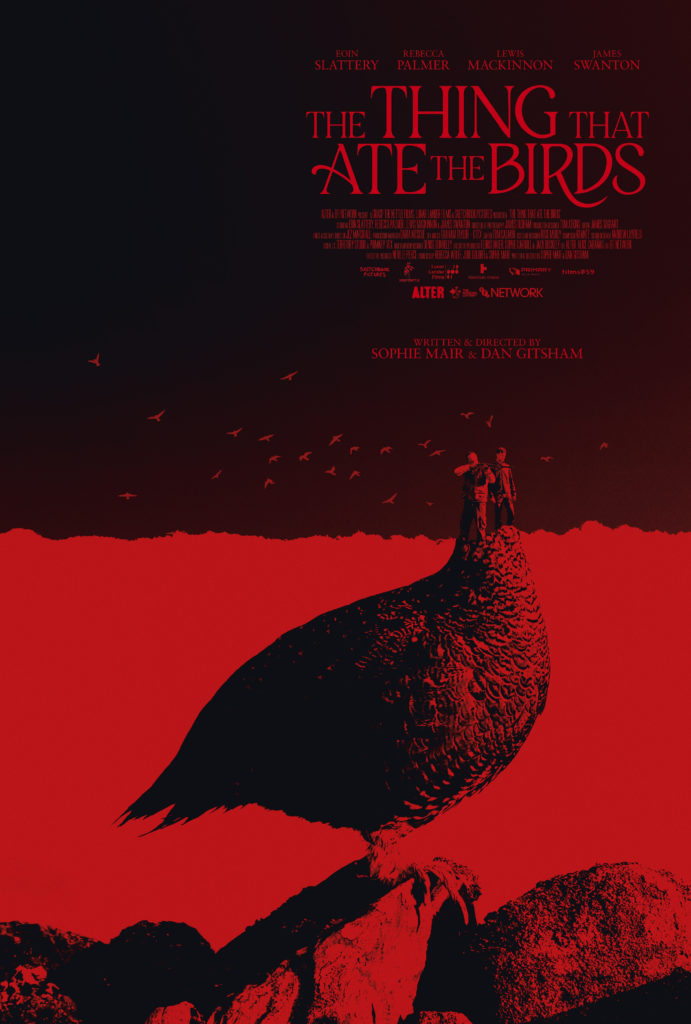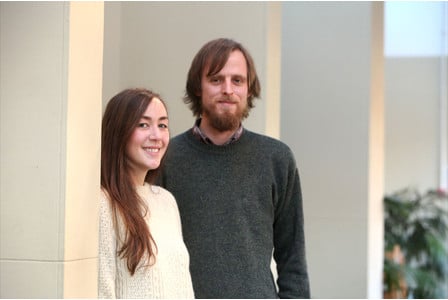
Whilst it’s usual to get screeners for feature-length projects arriving in the site inbox, it’s less usual to get screeners for short films, so it was great to hear from the UK-based Sketchbook Pictures a couple of weeks ago: Sketchbook has (thus far anyway) exclusively worked in short film – a medium which Warped Perspective has long championed. Warped Perspective not only reviewed The Thing That Ate The Birds, the short film which they sent, but we were also able to embed a link where readers could turn into viewers, and view the film for free: if you missed that one, well click here. You can come back afterwards.
Sophie and Dan then very kindly agreed to answer a few questions about their work to date. Enjoy!
1) Firstly, how did you guys come to be working together on film? And how do you work as a team?
We fell in love first and are now married with two boys. Along the way, we started collaborating whilst Sophie was at art school, firstly with Dan as Director/Writer and Sophie as Art-Director/Producer, but this evolved into collaborating on the writing and then eventually as co-writer/co-directors. It was a natural evolution for us.
It’s hard to define exactly how we work as a team as we’ve been doing it in different capacities for so long, so it feels very organic. Hopefully we are on the same page, trust, empower and don’t talk over each other (too much)!
2) Thinking about your careers so far – what is your proudest moment?
It was a very special day when we found out that The Thing That Ate The Birds had been selected for SXSW in 2021.
3) You have made a number of short films to date: what, in your opinion, makes for a really great short film?
Some of our favourite shorts like Nash Edgerton’s Spider, Simon Ellis’s Soft and Rúnar Rúnarsson’s Two Birds are all brilliantly executed, simple and clear narratives with big repercussions. These are three absolute gems that are well worth seeking out.

For us, we always try to keep the essence of our shorts as simple as possible, so with The Thing That Ate The Birds it’s structured around the question of what is killing the birds? With ‘Bill’ (a DIY short we made in 2019) it’s based around the idea of a woman trying to communicate with a dead loved one.
4) In terms of The Thing That Ate The Birds, where did the idea for this come from? Would I be right in thinking you could interpret events in the film in a more symbolic sort of way than taking it at face value, or did you not really have any sort of intent regarding that?
Sophie grew up in the North Yorkshire Dales and we both lived in a small farmhouse on the moors for a year in our late 20s where we got to know the local gamekeepers and take part in grouse shoots. This was a fascinating window into a world that not everyone gets to see, and we’ve always loved the friction between commerce and conservation that lies at the heart of what a gamekeeper does. It felt like a great backdrop and setting for a horror film.
We wrote the film during the Brexit campaign when it really felt like communication and nuance had disappeared from the political discourse and in lots of ways, we felt that the country was losing its head, hence the themes and backdrop of the film.

The key theme and takeaway for us was lack of communication (both in his marriage, the world outside and how he deals with unfamiliar intruders on his land) so we worked hard to make the genre and drama elements reflect each other and propel how his actions have tragic consequences.
The idea that the film could be seen more as symbolic is totally valid and became more apparent to us as we were working in the edit – but in saying that, our stance is that everything you see in the film happens to the characters.
5) Short films are often an important part of film festivals: it can be frustrating, then, that excellent shorts don’t often get widely seen or known about beyond the festival circuit. Is that something you have found yourselves? Do you think there is scope for short films to be more widely appreciated, and if so – how?
Funnily enough we were talking about this the other day. There must be thousands of shorts and features that are not online or in an archive and could be potentially lost forever.
For us short film is an art form of its own and now there are fantastic platforms to place your film post festival run, for example ALTER, DUST, Short of the Week, Vimeo, etc. Channels like Alter and Dust are great, because they have subscribers and an inbuilt audience which has been a big help to us getting more eyes on our work.
It would be great to programme more shorts before features at the cinema or on TV channels like Film Four, but advertising rules, so it’s either a 15-minute short film or 15 minutes of adverts…
6) What draws you to genre filmmaking in particular?
We love it for the pure genre thrills of tension and suspense, but also for the way fantasy and genre can talk about the truth of human existence, fear of the unknown and politics – whilst making you either sick or laugh or both. There are endless possibilities to genre!
7) And finally…what are your plans moving forward – do you have any exciting projects on the way that you can mention?
We are about to start developing a feature screenplay with a well-known partner that we cannot name yet. It’s another horror film set on the Yorkshire moors. And in the summer, we should be shooting our first music video – which will contain genre elements, of course…
Many thanks to Sophie and Dan for their time. You can keep up with Sketchbook Pictures on Twitter and Instagram.
